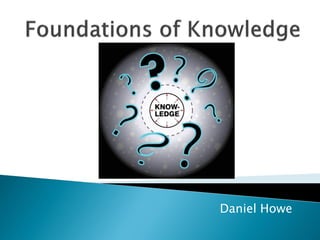The Foundations of knowledge
•
1 like•204 views
a project for speech 104 ,fall 2010 at lavc
Report
Share
Report
Share
Download to read offline

Recommended
Recommended
More Related Content
Viewers also liked
Viewers also liked (20)
Контен-политика и идеи 5 конкурсов для проекта BUBBLEGUM

Контен-политика и идеи 5 конкурсов для проекта BUBBLEGUM
исследование и оценка социальных сетей рунета Для продвижения проекта BUBLEGU...

исследование и оценка социальных сетей рунета Для продвижения проекта BUBLEGU...
κατασκευη ιστοσελιδων-με-Proactive-seo-seo-in-greece

κατασκευη ιστοσελιδων-με-Proactive-seo-seo-in-greece
Le Contenu Marketing pour valoriser votre entreprise sur Internet

Le Contenu Marketing pour valoriser votre entreprise sur Internet
Guide Publicis Consultants - LInkedIn : le contenu, moteur d'influence

Guide Publicis Consultants - LInkedIn : le contenu, moteur d'influence
Dépassez la relation de prospection avec les Comités IT France

Dépassez la relation de prospection avec les Comités IT France
Similar to The Foundations of knowledge
Similar to The Foundations of knowledge (20)
Lesson Note (Week 1) first presentation [Autosaved] [Autosaved] [Autosaved].pptx![Lesson Note (Week 1) first presentation [Autosaved] [Autosaved] [Autosaved].pptx](data:image/gif;base64,R0lGODlhAQABAIAAAAAAAP///yH5BAEAAAAALAAAAAABAAEAAAIBRAA7)
![Lesson Note (Week 1) first presentation [Autosaved] [Autosaved] [Autosaved].pptx](data:image/gif;base64,R0lGODlhAQABAIAAAAAAAP///yH5BAEAAAAALAAAAAABAAEAAAIBRAA7)
Lesson Note (Week 1) first presentation [Autosaved] [Autosaved] [Autosaved].pptx
Recently uploaded
Mehran University Newsletter is a Quarterly Publication from Public Relations OfficeMehran University Newsletter Vol-X, Issue-I, 2024

Mehran University Newsletter Vol-X, Issue-I, 2024Mehran University of Engineering & Technology, Jamshoro
God is a creative God Gen 1:1. All that He created was “good”, could also be translated “beautiful”. God created man in His own image Gen 1:27. Maths helps us discover the beauty that God has created in His world and, in turn, create beautiful designs to serve and enrich the lives of others.
Explore beautiful and ugly buildings. Mathematics helps us create beautiful d...

Explore beautiful and ugly buildings. Mathematics helps us create beautiful d...christianmathematics
Recently uploaded (20)
Mixin Classes in Odoo 17 How to Extend Models Using Mixin Classes

Mixin Classes in Odoo 17 How to Extend Models Using Mixin Classes
Kodo Millet PPT made by Ghanshyam bairwa college of Agriculture kumher bhara...

Kodo Millet PPT made by Ghanshyam bairwa college of Agriculture kumher bhara...
UGC NET Paper 1 Mathematical Reasoning & Aptitude.pdf

UGC NET Paper 1 Mathematical Reasoning & Aptitude.pdf
This PowerPoint helps students to consider the concept of infinity.

This PowerPoint helps students to consider the concept of infinity.
Unit-IV; Professional Sales Representative (PSR).pptx

Unit-IV; Professional Sales Representative (PSR).pptx
Explore beautiful and ugly buildings. Mathematics helps us create beautiful d...

Explore beautiful and ugly buildings. Mathematics helps us create beautiful d...
Basic Civil Engineering first year Notes- Chapter 4 Building.pptx

Basic Civil Engineering first year Notes- Chapter 4 Building.pptx
The Foundations of knowledge
- 1. Daniel Howe
- 2. Knowledge is the acquaintance with facts, truths, or principles; the fact or state of knowing; the perception of fact or truth; clear and certain mental apprehension. The definition mentioned above makes one realize that knowledge comes from memorizing and thinking, as well as one’s personal experiences. Knowledge involves intelligence, emotion and skill.
- 3. Edward deBono compares our mental process with three parts of an automobile engine. ◦ Motor = intelligence ◦ Fuel = knowledge ◦ Tune-up = thinking Just as there are different types of motors - four cylinders, six cylinders and eight cylinders, there are different types of intelligence. When all three elements of an engine work together the car runs well. Likewise, when all three mental processes are working well, a person is considered to be smart.
- 4. Each person has a certain sized motor (aka intelligence) The grade of fuel (knowledge) can be raised by reading books, taking classes, reading the newspaper, etc. The more information we expose ourselves to, the more knowledge we receive. The level of tuning (thinking skills) can always improve as well.
- 5. Lateral thinking is a way of solving problems using creative new approaches. Rather than relying on the same perceptions, concepts and boundaries we normally use, we need to think outside the box and bring in new ideas in order to approach the problem from a different angle.
- 6. Edward deBono defines lateral thinking using four aspects: ◦ 1) recognize main ideas ◦ 2) search for different ways of looking at things ◦ 3) be flexible in your thinking ◦ 4) use change to encourage other ideas
- 7. Lateral thinking can: ◦ turn problems into opportunities ◦ find alternative solutions ◦ increase the number of new ideas using unconventional thinking ◦ give a new starting point to come up with new solutions
- 8. Traditional IQ focused on two types of intelligence. ◦ Linguistic intelligence (using words and language) ◦ Logical-mathematical intelligence (reasoning) Michael Gardner goes beyond this and defines eight types of intelligence.
- 9. 1. Linguistic (“word smart”) 2. Logical-mathematical (“number smart”) 3. Spatial (“picture smart”) 4. Kinesthetic (“body smart”)
- 10. 5. Musical (“music smart”) 6. Interpersonal (“people smart”) 6. Intrapersonal (“self smart”) 7. Naturalist (“nature smart”)
- 11. Being able to identify with and empathize with others, relating to them effectively shows a high level of emotional intelligence. Daniel Goleman believes that emotional intelligence is a foundation for social intelligence. To understand one’s own level of emotional intelligence just take an Emotional Intelligence Test.
- 12. There is a difference between intelligence and thinking There are different types of intelligence Thinking is a skill that can be improved Emotions need to be understood and used No matter how “smart” a person is, they can always improve.